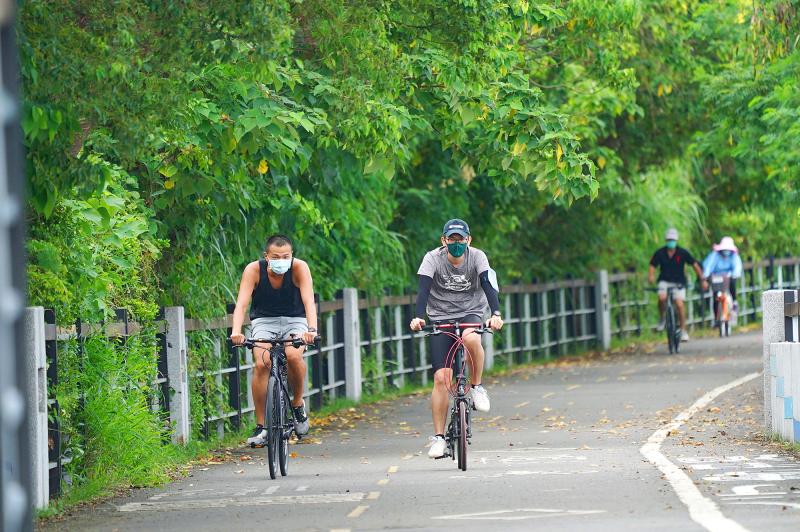The nation’s exports of electric bicycles surpassed those of traditional bikes in the first five months of this year, with the export value of the former hitting a new high for the period, the Ministry of Finance has said.
Electric bike exports totaled US$550 million in the January-to-May period, up 44.2 percent from a year earlier, compared with US$530 million generated by traditional bicycle producers, up 38 percent annually, data compiled by the ministry showed.
Rising tensions between the US and China prompted foreign buyers of electric bikes to shift their orders to Taiwan, while growing awareness of environmental issues also boosted shipments, the ministry said.

Photo: CNA
Electric bicycles emerged as a new growth driver in the nation’s vehicle and component exports in the first five months, when the export value hit US$5.32 billion, up 41.2 percent from a year earlier, it said.
The slower growth in traditional bikes reflected a fall in international demand as the global economy was hit by the COVID-19 pandemic and there was an increase in bike-sharing worldwide, the ministry added.
The US was the largest buyer of Taiwanese electric bicycles, accounting for 39.3 percent of total outbound sales in the first five months, while Europe was the top foreign buyer of traditional bikes, making up 67 percent of the total.
Data on vehicle and part exports from Taiwan cover passenger vehicles and components as well as bicycles and bicycle parts, according to the ministry.
In the five-month period, bike component exports totaled US$1.74 billion, up 65.2 percent from a year earlier, with Europe the largest buyer, accounting for 53.6 percent of total sales, ahead of the US (14 percent) and ASEAN (12 percent), the ministry said.
Bicycle components accounted for a greater share of vehicle and component sales during the period, making up 32.8 percent of total sales, compared with 30.7 percent last year, it said.
Passenger car exports totaled US$400 million in the first five months, up 47.7 percent from a year earlier, the ministry said, citing the effects of reopening economies around the world.
The Middle East was the largest buyer of passenger cars, with purchases accounting for 43.3 percent of the total in the five-month period, but the growth moderated from more than 80 percent in the past few years, a reflection of the region’s weaker economy, the ministry said.
The US was the second-largest buyer of Taiwan’s passenger cars during the period, making up 17.2 percent on the back of strong demand for all-terrain vehicles, ahead of Europe (14.8 percent), and China and Hong Kong (14.4 percent), it said.

UNCERTAINTY: Innolux activated a stringent supply chain management mechanism, as it did during the COVID-19 pandemic, to ensure optimal inventory levels for customers Flat-panel display makers AUO Corp (友達) and Innolux Corp (群創) yesterday said that about 12 to 20 percent of their display business is at risk of potential US tariffs and that they would relocate production or shipment destinations to mitigate the levies’ effects. US tariffs would have a direct impact of US$200 million on AUO’s revenue, company chairman Paul Peng (彭雙浪) told reporters on the sidelines of the Touch Taiwan trade show in Taipei yesterday. That would make up about 12 percent of the company’s overall revenue. To cope with the tariff uncertainty, AUO plans to allocate its production to manufacturing facilities in

TAKING STOCK: A Taiwanese cookware firm in Vietnam urged customers to assess inventory or place orders early so shipments can reach the US while tariffs are paused Taiwanese businesses in Vietnam are exploring alternatives after the White House imposed a 46 percent import duty on Vietnamese goods, following US President Donald Trump’s announcement of “reciprocal” tariffs on the US’ trading partners. Lo Shih-liang (羅世良), chairman of Brico Industry Co (裕茂工業), a Taiwanese company that manufactures cast iron cookware and stove components in Vietnam, said that more than 40 percent of his business was tied to the US market, describing the constant US policy shifts as an emotional roller coaster. “I work during the day and stay up all night watching the news. I’ve been following US news until 3am

COLLABORATION: Given Taiwan’s key position in global supply chains, the US firm is discussing strategies with local partners and clients to deal with global uncertainties Advanced Micro Devices Inc (AMD) yesterday said it is meeting with local ecosystem partners, including Taiwan Semiconductor Manufacturing Co (TSMC, 台積電), to discuss strategies, including long-term manufacturing, to navigate uncertainties such as US tariffs, as Taiwan occupies an important position in global supply chains. AMD chief executive officer Lisa Su (蘇姿丰) told reporters that Taiwan is an important part of the chip designer’s ecosystem and she is discussing with partners and customers in Taiwan to forge strong collaborations on different areas during this critical period. AMD has just become the first artificial-intelligence (AI) server chip customer of TSMC to utilize its advanced

Six years ago, LVMH’s billionaire CEO Bernard Arnault and US President Donald Trump cut the blue ribbon on a factory in rural Texas that would make designer handbags for Louis Vuitton, one of the world’s best-known luxury brands. However, since the high-profile opening, the factory has faced a host of problems limiting production, 11 former Louis Vuitton employees said. The site has consistently ranked among the worst-performing for Louis Vuitton globally, “significantly” underperforming other facilities, said three former Louis Vuitton workers and a senior industry source, who cited internal rankings shared with staff. The plant’s problems — which have not